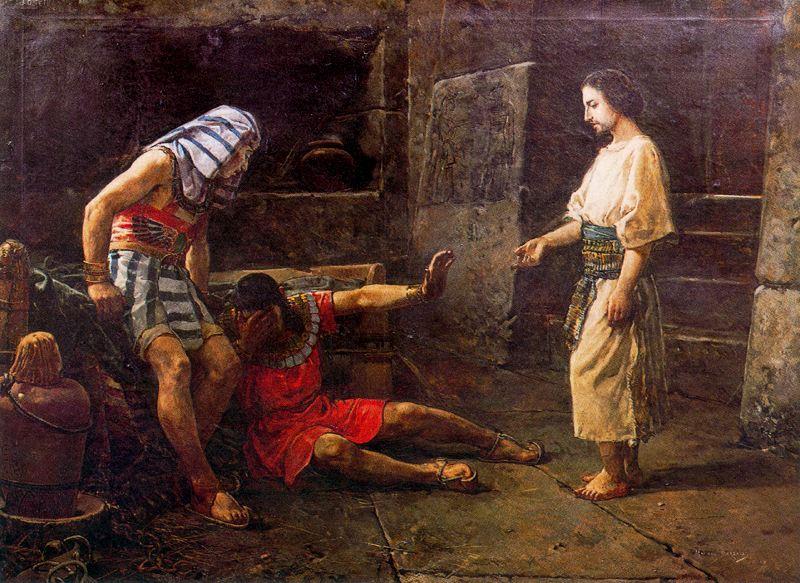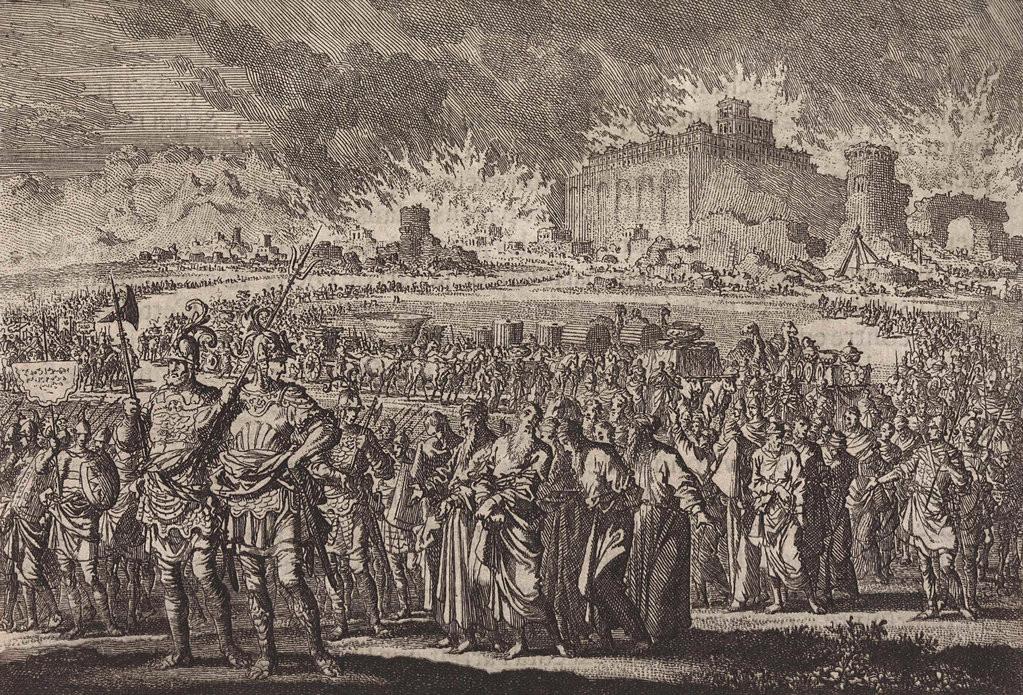51 Then David ran and stood over the Philistine and took his sword and drew it out of its sheath and killed him and cut off his head with it. When the Philistines saw that their champion was dead, they fled. 52 And the men of Israel and Judah rose with a shout and pursued the Philistines as far as Gath and the gates of Ekron, so that the wounded Philistines fell on the way from Shaaraim as far as Gath and Ekron. 53 And the people of Israel came back from chasing the Philistines, and they plundered their camp. 54 And David took the head of the Philistine and brought it to Jerusalem, but he put his armor in his tent.
55 As soon as Saul saw David go out against the Philistine, he said to Abner, the commander of the army, “Abner, whose son is this youth?” And Abner said, “As your soul lives, O king, I do not know.” 56 And the king said, “Inquire whose son the boy is.” 57 And as soon as David returned from the striking down of the Philistine, Abner took him, and brought him before Saul with the head of the Philistine in his hand. 58 And Saul said to him, “Whose son are you, young man?” And David answered, “I am the son of your servant Jesse the Bethlehemite.” – 1 Samuel 17:51-58 ESV
David had just conquered the enemy of the Lord by defeating Goliath and cutting off the giant’s head with his own sword. As a result, the Philistines ran rather than face the prospect of becoming slaves to their much-hated enemies, the Jews. It had been Goliath who had set the conditions for the battle, guaranteeing the enslavement of the army of the losing combatant; but his troops, never expecting him to lose, were unwilling to keep the terms he had established. They turned and ran. But David’s unexpected victory gave the troops of Israel new life and the boldness to pursue the Philistines all the way back to Goliath’s hometown. One man’s faith in God revealed the power of God and provided the people of God with the incentive they needed to fight the enemies of God.
David, fresh off his victory and still carrying the severed head of Goliath in his hand, was brought before King Saul. It seems that, while David was already in the employment of Saul, acting as his armor bearer and court musician, the king knew little about him. Neither Saul nor his commander, Abner, knew who David’s father was. This is interesting because chapter 16 makes it quite clear that Saul had been well-informed about David before he conscripted him into service.
One of the servants said to Saul, “One of Jesse’s sons from Bethlehem is a talented harp player. Not only that—he is a brave warrior, a man of war, and has good judgment. He is also a fine-looking young man, and the Lord is with him.”
So Saul sent messengers to Jesse to say, “Send me your son David, the shepherd.” Jesse responded by sending David to Saul, along with a young goat, a donkey loaded with bread, and a wineskin full of wine. – 1 Samuel 16:18-19 NLT
But enough time had passed so that Saul had forgotten all about how David had come into his service. And it would seem that Saul was not in the habit of concerning himself with the life details of the men whom he forced into his service as soldiers. God had warned the people of Israel just what kind of king Saul would become.
The king will draft your sons and assign them to his chariots and his charioteers, making them run before his chariots. Some will be generals and captains in his army, some will be forced to plow in his fields and harvest his crops, and some will make his weapons and chariot equipment. The king will take your daughters from you and force them to cook and bake and make perfumes for him. – 1 Samuel 8:11-13 NLT
So it’s not surprising that Saul had no idea who David really was. But he needed to learn the name of David’s father so that he could fulfill his promise of the reward.
The king has offered a huge reward to anyone who kills him. He will give that man one of his daughters for a wife, and the man’s entire family will be exempted from paying taxes! – 1 Samuel 17:25 NLT
When Saul asked David who his father was, he responded, “I am the son of your servant Jesse the Bethlehemite” (1 Samuel 17:58 ESV). In answering Saul’s question, David was revealing something even more significant. This young shepherd boy was from the village of Bethlehem. This somewhat obscure and insignificant spot on the map would one day become the most important destination in the world. It is there that the future Messiah of the Jews would be born.
And because Joseph was a descendant of King David, he had to go to Bethlehem in Judea, David’s ancient home. He traveled there from the village of Nazareth in Galilee. – Luke 2:4 NLT
Under the inspiration of the Holy Spirit, the prophet Micah predicted the future arrival of another ruler who would also hail from the tiny village of Bethlehem.
But you, O Bethlehem Ephrathah, are only a small village among all the people of Judah. Yet a ruler of Israel will come from you, one whose origins are from the distant past. – Micah 5:2 ESV
While David’s defeat of Goliath seems to be the central focus of the story, there is far more going on than initially meets the eye. God was actually paving the way for a much greater victory over a much more significant enemy. He was setting the stage for not only David’s kingship but also that of His Son, the future Messiah and the King of kings and Lord of lords. David slew one man and provided his people with temporary relief from slavery, but Jesus Christ would defeat sin and death by sacrificing His life so that condemned men and women might be free from slavery to both. What David did to Goliath was a foreshadowing of what Jesus would do to Satan, our adversary (1 Peter 5:8) and accuser (Revelation 12:10). David, a former shepherd, delivered the flock of God from the jaws of Goliath, “the roaring lion” who had sought to devour the sheep of God’s pasture. Jesus, “the great shepherd of the sheep” (Hebrews 13:20), would do the same, but He would provide a greater deliverance that would have eternal significance.
And the dragon lost the battle, and he and his angels were forced out of heaven. This great dragon—the ancient serpent called the devil, or Satan, the one deceiving the whole world—was thrown down to the earth with all his angels.
Then I heard a loud voice shouting across the heavens,
“It has come at last—
salvation and power
and the Kingdom of our God,
and the authority of his Christ.
For the accuser of our brothers and sisters
has been thrown down to earth—
the one who accuses them
before our God day and night.
And they have defeated him by the blood of the Lamb
and by their testimony.
And they did not love their lives so much
that they were afraid to die. – Revelation 12:8-11 NL
David’s victory was not insignificant; it breathed new life into the Israelite army. But the victory accomplished by Jesus brought eternal life to all those who place their faith in Him. David defeated Goliath. Jesus defeated Satan. David’s victory was temporary. Jesus’ victory was permanent. The victory David accomplished required the life of a Philistine. The victory Jesus brought about was at the expense of His own life. Goliath died for his own sins, having defied the armies of the living God. Yet Jesus died for the sins of others so that He might become the propitiator who satisfies the just demands of a holy God.
The story surrounding the life of David is intended to foreshadow and point towards the life of Jesus. The young shepherd boy from Bethlehem serves as a representation of the good shepherd to come. As David stood before Saul with Goliath’s severed head in his hands, he was a Christ figure, a human representation of the One who would also call Bethlehem His home and grow up to become the deliverer of God’s people.
But David was about to find out that his victory, while good news to many, was going to end up creating bad news for him. His defeat of the giant Goliath was going to make him a household name and a hero among the people of Israel. But his soaring popularity would cause a growing rift between him and the king. David’s greatest conflicts were ahead of him, not behind him, and his most formidable enemy would prove to be none other than Saul, the king of Israel. David’s victory would produce in Saul jealousy and resentment that manifested in an ever-intensifying desire to eliminate this potential threat to his reputation and rule.
English Standard Version (ESV) The Holy Bible, English Standard Version. ESV® Permanent Text Edition® (2016). Copyright © 2001 by Crossway Bibles, a publishing ministry of Good News Publishers.
New Living Translation (NLT) Holy Bible, New Living Translation, copyright © 1996, 2004, 2015 by Tyndale House Foundation. Used by permission of Tyndale House Publishers Inc., Carol Stream, Illinois 60188. All rights reserved.

